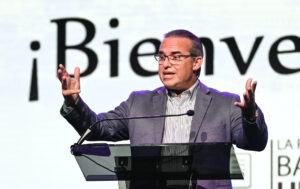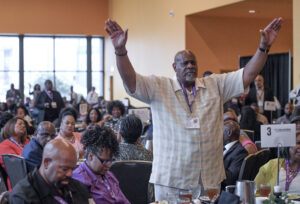
NASHVILLE, Tenn. (BP)–The wife of a Chinese believer imprisoned for his faith has filed an unprecedented court motion calling for the presiding judge in the case to be removed. Tong Houyong and two other Christian men were each sentenced to one year of “re-education through labor” for organizing an “illegal gathering” of house church Christians in December 2007.
In late January 2009, Tong’s wife filed the motion in Henan province after a local court refused to accept an administrative lawsuit in the case, according to the human rights organization ChinaAid. The motion to dismiss the chief justice alleges the court had no legal basis to refuse the case, violated the law by refusing to provide receipts documenting the lawsuit had been filed and violated legal procedure by causing a long delay without making a decision on the case.
“We applaud the courageous move by the house church leader to pursue justice in light of religious persecution with the spirit of rule of law,” said ChinaAid’s president, Bob Fu. “We urge the international community to continue to pressure this Chinese local court to up hold true justice by overturning the illegal decision against the three church leaders.”
PRAYING NURSE REINSTATED AFTER HEARING — A Christian nurse in England who was suspended without pay for offering to pray for a patient was reinstated after a disciplinary hearing. Caroline Petrie of Weston-super-Mare was accused of failing to demonstrate a “personal and professional commitment to equality and diversity” by offering to pray for the patient, who reportedly was not offended by the offer.
The employer, North Somerset Primary Care Trust, said in a Feb. 5 statement that they recognized Mrs. Petrie had been acting in the “best interests of her patients” and that nurses did not have to “set aside their faith” in the workplace and could “continue to offer high quality care for patients while remaining committed to their beliefs,” according to the Christian Legal Centre, which represented Petrie. The statement also said that some people recognize prayer as an “integral part of health care and the healing process.”
“This is a great victory for Mrs. Petrie, and for common sense,” said Andrea Williams, director of the Christian Legal Centre. “Today’s decision highlights the importance of being able to take personal faith into the workplace rather than being forced to leave it at the door for fear of being silenced by equality and diversity policies.”
DUTCH LAWMAKER TO BE PROSECUTED OVER FILM — Geert Wilders, a Dutch lawmaker whose film, “Fitna,” draws links between Islamic extremism and the Quran, Islam’s holy book, will be prosecuted for “inciting hatred and discrimination against Muslims.”
The Netherlands’ Court of Appeal ruled Jan. 21 that criminal prosecution was “obvious for the insult of Islamic worshippers” because Wilders compared parts of their faith with Nazism, the Bloomberg news service reported. The ruling overturned a prosecutor’s decision last year not to charge Wilders.
In a statement posted on the Web site of the Dutch Freedom Party, Wilders said: “I see this as a black day. If you voice your opinion, you run the risk of being prosecuted.” His 15-minute movie places verses from the Quran alongside images of the Sept. 11 terrorist attacks on New York City and Washington, D.C. It calls for Muslims to rip “hate-preaching” verses from the book. Wilders opposes what he calls the “Islamization of the Netherlands” and in a newspaper editorial said the Quran should be banned.
UN Secretary General Ban Ki-moon has called the film “offensively anti-Islamic.”
SRI LANKA WEIGHS ANTI-CONVERSION LAW — Lawmakers in Sri Lanka are set to debate an anti-conversion bill that could criminalize humanitarian assistance provided by religious groups.
The Buddhist political party proposing the “Prohibition of Forcible Conversion of Religion Bill” claims it would only restrict “fundamentalist” groups from using monetary rewards or coercive methods to convert people. However one human rights organization, International Christian Concern, asserts that the language of the bill is so broad that relief efforts of non-Buddhist religious groups could be subject to criminal penalties.
“The bill is especially concerning because it is the culmination of a widespread pattern of violent attacks on Christians in Sri Lanka,” said a statement released by International Christian Concern. “Similar measures enacted in several Indian states such as Orissa have led to an increase in attacks on Christians. If this bill is passed, it would likely serve to legitimize anti-Christian persecution.”
The bill was first introduced in the Sri Lankan parliament in 2004 and subsequently was challenged in the country’s supreme court, which invalidated two clauses in the law.
–30–
Mark Kelly is an assistant editor with Baptist Press.














